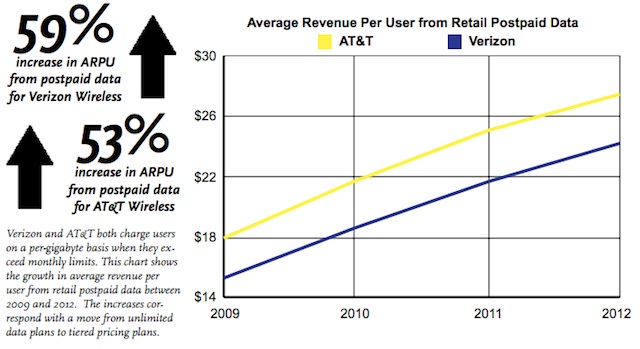
Why do so many Americans now live with Internet data caps—and what are these caps doing to the future of broadband? Those are the questions posed by a new paper from the New America Foundation, which wants to shake up the lethargy that has descended over the data caps debate by pointing out just how odd the caps truly are. "Internet service and mobile providers appear to be one of the few industries that seek to discourage their customers from consuming more of their product," write the paper's authors. "The reason for this counterintuitive business model is that in the noncompetitive US marketplace, it is highly profitable."
The arguments presented here aren't novel, but they do act as a fine summation of the anti-cap position (and the report is only 13 pages, making it a quick read). First up, the paper questions the very existence of data caps, which are now imposed by most major wireline and wireless Internet providers in the US, by noting that monthly limits have little to do with moment-to-moment congestion. While Internet providers like Comcast realize this and have taken steps to address actual congestion, many of them still impose monthly limits to stop "excessive use" of data.
The truly curious thing about the entire debate has been the way in which caps have mostly remained steady for years, even as the price of delivering data has plunged. For example, paying for transit capacity at a New York Internet exchange costs 50 percent less now than it did just one year ago, and many major ISPs aren't paying at all to exchange data thanks to peering. So why don't prices seem to fall? When I have asked this question in the past, ISPs have responded with a variety of answers, but one of the most popular is that the costs to move data are in fact dirt cheap, but the labor needed to build and maintain the network is not, and such operating expenses are not one-time, but ongoing.
The authors of the new paper contend that all explanations are more or less hand-waving designed to disguise the fact that Internet providers are now raking in huge—in some cases, record—profit margins, without even the expense of building new networks. (Apart from Verizon FiOS and Google Fiber, most cable and DSL operators in the US still offer service over upgraded versions of networks they built and paid for long ago.) While Internet users have to endure a ceaseless litany of complaints about a "spectrum crunch" and an "exaflood" of data from which ISPs are suffering, most wireline ISPs are actually investing less money in their network as a percentage of revenue, and wireless operators like AT&T and Verizon are seeing huge growth in their average revenue per user (ARPU) numbers after phasing out unlimited data plans—which means money out of your pocket. In the view of the New America authors, this revenue growth is precisely the point of data caps.

The concern here isn't just that Americans will spend too much for Internet access, but that they will also find themselves deterred from using hot new services thanks to concerns about data usage. Such limits could encourage users to adopt ISP's own unlimited services for telephone and television, for instance, rather than those services delivered over the Internet. "Over the longer term," was how it 2011 Credit Suisse presentation put it, "consumption based billing could reduce the attractiveness of over-the-top video options (e.g., Netflix and Hulu)." Critics have long speculated that this was in fact the ISP plan all along.
In a competitive market, how can Internet providers get away with holding prices steady even as their own costs drop? The New America report provides a simple answer: the market is not actually competitive, either in wireline (where most people have one or two good choices, and often just one truly high-speed choice) or in wireless (where AT&T and Verizon dominate, and where their customer "churn" rate is below one percent). Caps are "a strategy for ISPs to increase their revenue per user," says the report. "The trend is driven in large part by a woefully uncompetitive market that allows the nation's largest providers to generate enormous profits, as well as enable them to protect their legacy business models from new services and innovators."
One has only to look at an ISP like France's Free to see what an innovative Internet competitor looks like; unfortunately, things have gotten so bad in the US that cities like Chicago, Seattle, and Chattanooga have opted to build their own fiber networks to get the job done, while companies like Google are trying to prod existing ISPs into greater efficiency and higher speeds by building select fiber networks of their own—an implicit counter-argument to all the "we need data caps and have to charge high prices" doom and gloom that one hears from most ISPs.
Anecdotally, Ars staffers report almost no issues with wireline data caps, though the far more draconian mobile caps create regular problems. As mobile devices play ever-larger roles in our personal and work lives, the situation becomes more troubling, as does the fact that the wireline data caps are generally not being upped yearly and will cause increasing problems, especially for families.
But what to do about the situation? Ah, well, that's always the problem. The New America authors do have some ideas, including more regulation of "special access" lines and lowering the barriers to switching wireless carriers, but these aren't the sorts of things like to bring about, in the short term, the competitive wonderland that the authors envision.
reader comments
181